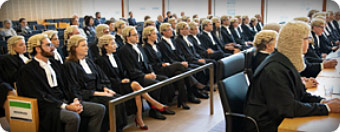- Regional Bar
- Queensland Regional Courthouses
- Reviews and the Arts
- Book - Brisbane Breached: The Story of a Drought Defaulted Floodplain
- Book - The Immigration of Irish Lawyers to Australia in the Nineteenth Century - Causes and Consequences
- Book - The Great Divide: Australia's Housing Mess and How to Fix It
- Book - Law: The Way of the Ancestors
- Book - Killing for Country: A Family Story
- Book - Seddon on Deeds, 2nd Edition, 2022
- Book - You Talk, We Die: The battle for Victoria's First Safe Injecting Facility
- Album - Nirvana - MTV Unplugged in New York
- Song - Eric Clapton (Derek and The Dominos) ‘Layla’
- Professional Conduct and Practice
- How to Correct a Misleading Statement Made in Court
- The Ethics and Legality of Conferring with Another Party’s Expert
- Ethical Witness Preparation
- Bullfry Fights for “Face Time”
- A Decision to Maintain Confidence in the Legal Profession
- 6000 Emails Too Many
- Magistrates ‘Uncomfortable’ with Single Justice Procedure
- "Breach of Counsel's Professional Responsibility" by Delivering Submissions After Hearing or Beyond Leave Granted Upon Hearing
- Amendment to Barristers' Conduct Rules Proscribing Barristers Enjoying Interest in Solicitors’ Practices
- Barristers' Conduct Rules Proscribe Barrister Acting as a Paid Executor or Administrator or Acting as a Lawyer in Estate
- Advocacy
- What’s My Loss? “True Value” under Australian Consumer Law
- US Senior Appellate Judge Opines Generative AI has a Role to Play in Argument and Adjudication
- Vulnerability and Uncertainty in Purely Economic Loss
- The Court’s Role in Supporting Commercial Arbitration and Giving Effect to Arbitration Clauses
- Precedent in English Law
- Federalism, the Courts and Class Actions
- The Role and Running of Commissions of Inquiry: Australian Academy of Law seminar
- On the Admissibility of Common Forms of Evidence in Fraud/Corruption Trials
- The Impact and Use of Inconsistent Statements in a Criminal Trial
- But for the Civil Liability Act…
- From the President
- From the President
- From the Editor
- From the Editor
- Articles
- Get Out There!
- 10 Minutes with...QLRC Chair Fleur Kingham
- The Honourable Bruce McPherson CBE Memorial Lecture 2024
- Fast and Slow Thinking by Judges and other Human Beings
- Better Targeted Superannuation Concessions or Targeting Judicial Independence?
- Seven Random Points about Judging
- Evidence in Chief in Criminal Trials
- The Operation of the International Criminal Court
- Unanswered Questions about the Rules of Precedent
- A New Regime for Expert Evidence in Supreme Court Criminal Proceedings
- Reviews and the Arts
- Book - The Origins of Adversary Criminal Trial
- Book - Man Alone
- Book - Corporate Law and Governance in the 21st Century
- Book - Slow Horses
- Book - An Annotated Guide to the Human Rights Act 2019 (Qld)
- Book - Super-Infinite: The Transformations of John Donne
- Book - The Plant Thieves
- Album - The Rolling Stones 'Hackney Diamonds' (2023)
- Book - Evidence Law in Queensland (14th edition)
- Song - The Pogues 'Fairytale Of New York'
- Professional Conduct and Practice
- Noblesse of the Robe
- Citation of Authority - Supreme Court Practice Direction No 1 of 2024
- Lay Witness Evidence “Distorted and Manipulated” by Lawyer and Expert
- A Hitout as a British Barrister
- Lawyer Found to have Engaged in Professional Misconduct for Gross Discourtesy to Fellow Practitioner in Email Correspondence
- Don't Conduct Hearing if You Feel Unsafe, LCJ tells Judges
- Spanish Arbitrator Jailed in Relation to an International Arbitration
- ACSC Guide to Cyber Security in Business/Professional Practice
- Prosecutor’s Discretion to Initiate or Maintain Indictment Salient, Say Judges
- "And so it Ends": Prominent Judge Quits in Open Court after DPP Complaint
- Advocacy
- Opening Addresses in Criminal Trials
- Limits on the Duty of Utmost Good Faith
- "All I wanted to do was go Home and have some Sushi …" - on the Criminality of Anti-Social Behaviour
- Copyright – Chou v Metstech
- Sometimes Form is a Matter of Substance
- Application of ACL to Contract Made Outside Australia
- High Court Rules on Restitution of Unlawfully Levied Special Rates
- Reflections on the Lehrmann Trial: Part 1 - Open Justice in the Modern (Australian) Courtroom
- Contempt of Court for Breach of Injunction
- Orders for Costs Against Non-Party Litigation Funders
- Inter Alia
- Bar Cricket - Tub’s Club and CJ’s Trophy are Ours!
- Vale: Deirdre Francis O’Connor (February 1941 – January 2024)
- Contemporary Leaders Need to Measure Value – Not Time, Clicks or Keystrokes
- The Bicentenary of the Establishment of the Judiciary in Australia
- Criminal Law: Then, Now, Tomorrow
- Bullying in Court by Judges and Counsel - Bully for Bullfry
- Satisfying Self-Represented Litigants and Assisting Visiting Counsel with Local Knowledge – Neither Usually Ends Well!
- Australia’s Mediator Accreditation System Set to Evolve in 2024
- Updated AIJA Criteria for Judicial Appointment
- Court Services Victoria - Cyber Incident
- Partners
- Legal Home Loans
- Mazars
- Morgans Tynan Partners
- From the President
- From the President
- From the Editor
- Articles
- Generative AI and the Bar - A Long Way from the Horse and Cart but still a Fair Way to Travel!
- 10 Minutes with...ChatGPT
- Wrong Side of the Law: What Raised Judges’ Ire in 2023
- Is the Civil Trial System Past its Use-by Date?
- Lessons from the UK’s Post Office Scandal
- Is a US President Immune from Criminal Acts?
- Magistrate Wickham at Moreton Bay – Master of all he Surveyed
- Insolvent Corporate Trustees: Just More Questions
- Actions for Aviation Injuries and Death
- Peak Interest Rates - Are We There Yet?
- Issue 94: Dec 2023
- From the President
- From the Editor
- Retirement of the Hon Susan Kiefel AC KC as Chief Justice of the High Court of Australia
- The Honourable David Francis Jackson AM KC
- US Supreme Court Adopts Judicial Code of Conduct
- Judicial Bullying: The Last of the Legal Bloodsports?
- 10 Minutes with...the Honourable George Brandis KC
- Can Stoic Virtues Help Modern Lawyers Meet their Ethical Obligations?
- Vale: Sandra Day O’Connor (1930-2023)
- Social Media and Defamation Law
- Issue 93: Sep 2023
- eBrief Ready
- Sherrin Partners
- LexisNexis
- Put Paper in the Past
- Bar Flies Scoop the QLS Netball Pool
- Gremlins, Borgs, and Judicial Impartiality in Multi-Member Courts
- The Legacy of Sir Harry Gibbs on the Jurisprudence of Purely Economic Loss
- Therapeutic Jurisprudence and Mediation: Partners in Dispute Resolution
- Qld Law Reform Commission – a New Look
- A Way to Win-Win Negotiation
- Issue 92: Jun 2023
- LexisNexis
- Mazars
- Morgans
- Some Important Changes in the New Property Law Bill
- Class Actions 101
- The QCA and the Law as to Overturning an Unreasonable Verdict
- Not Bound by the Rules of Evidence
- Family Law – Same but Different
- When Ministerial Decisions Must Be Made Personally
- Insolvency – ‘Peak Indebtedness’
- Issue 91: Mar 2023
- LexisNexis
- Morgans
- Mazars
- Winners are Grinners; Well Almost!
- Bar v UQ Students Netball Match – 5 March 2023
- Wigs and Gowns
- CIA 1944 Tips for Organisational Sabotage – Sound Familiar in Modern Mores?
- Family Court Judge Writes to Children Concerning Custody Decision – “I have told your parents to stop the crap”
- Magic Circle Firm Rolls Out 'Gamechanger' ChatGPT-Type Platform
- Privacy – Prospective Statutory Right of Action and Statutory Tort
- Issue 90: Dec 2022
- Morgans
- Vincents
- Mazars
- True to the Land: A History of Food in Australia
- Podcast Review: What Makes a Good Mediator?
- Podcast Review: Barristers in the New Normal
- Darwin Spitfires Anniversary Edition: The Real Battle for Australia
- Speaking Notes for Executing Justice
- Zines and Stellios’s The High Court and the Constitution (7th ed)
- The History Thieves
- Issue 89: September 2022
- Everyone Is In Italy
- Conditional leave to replead
- Queenslander! Townsville CPD Enthralls
- AAT ABA Legal Assistance Referral Scheme
- He Claimed Mucho
- Language... The Chatham House Rule
- You Will Wear That Pleading, Me Lad!
- Should ties remain barristers’ required dress in court?
- Support For Your Pro Bono Work
- Opening Arguments
- Issue 88 - June 2022
- French Quarter Chambers
- The Chronicle of a Young Lawyer: A legal journey in the Territory of Papua and New Guinea
- Liar Liar - Podcast
- 10 minutes with ... Andrew Philp QC
- Bar Practice Courses
- Direction permitting evidence by videolink (pandemic orders)
- Personalia ... Law Students, August 1956
- The Brisbane River Flood litigation falls - CLA s 36 rises
- The Art of Written Submissions
- A bit of a chuckle ... Grandad's Inquest
- Issue 87
- Morgans
- From the Editor
- Flight From Paradise
- City on Fire
- Case Note: Reflections on the recent High Court Decision in Love Commonwealth of Australia [2020] HCA 3: The Constitution, Indigenous Rights and Immigration Law
- Abandoning Non Delegable Duty of Care
- Freyberg: A Life's Journey
- Going Dark - The Secret Social Lives of Extremists
- The Second Annual Bench vs. Bar Cricket Match
- Love v the Commonwealth and Constitutional Recognition; is Australia getting close?
- Issue 86: August 2020
- Vincents
- Mazars
- Case Note: AED v Registrar-General of Births, Deaths and Marriages [2019] QSC 287 — Discharging adoption in “exceptional circumstances” under section 219(1)(c) of the Adoption Act 2009
- COVID-19 Updates
- From the President
- From the Editor
- Supreme Court Library Queensland — Answering Frequently Asked Questions
- BAQ Indigenous Law Student Program strikes Advocacy Flame for Wyatt
- Retirement of His Honour Chief Judge Kerry O’Brien
- The Legal Career of John Griffin QC
- Issue 85: Mar 2020
- CPD Seminar: Ethics - Thinking with your brain and with your body: The neurobiology of decision making and implications for mental health and well-being
- 2019 Employment and Industrial Relations Conference
- From the Courts — Practice Directions
- Speeches and Legal Articles of Interest
- Bar Practice Course 73
- President's Welcome
- Tri-State Bar Sports Law Conference & Football Tournament
- The Ouija Board Jurors: Mystery, Mischief and Misery in the Jury System
- Interpretation of Testamentary Documents
- Jesting Pilate and Other Papers and Addresses



